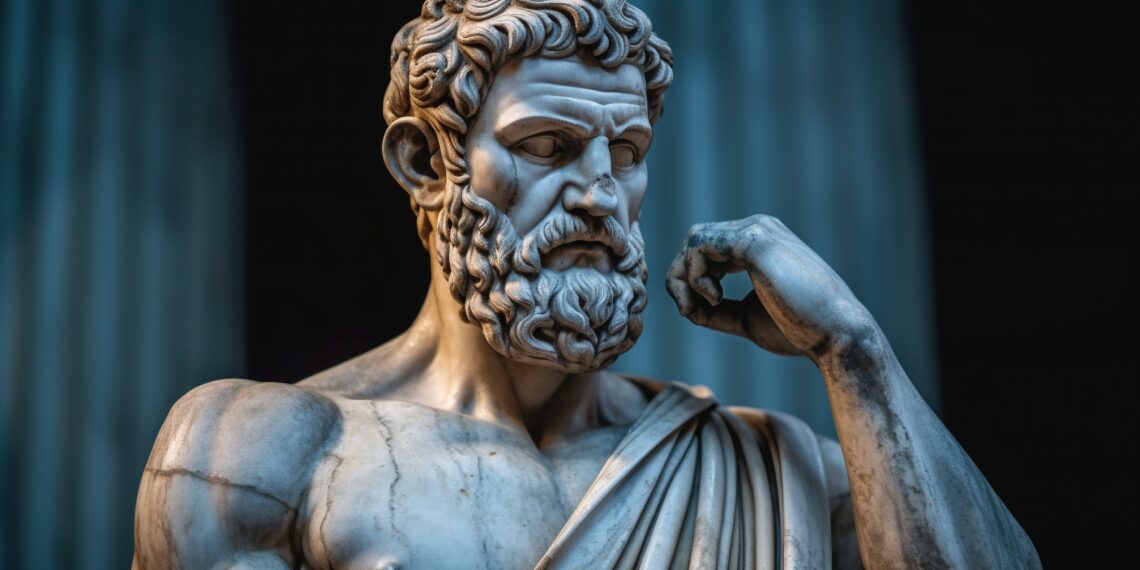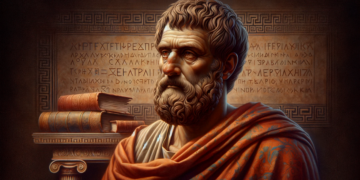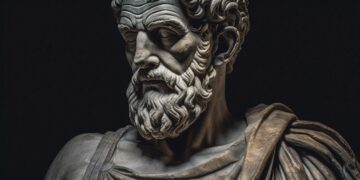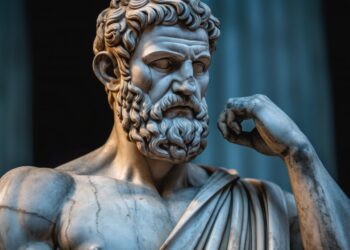Cleanthes of Assos, born in the ancient city of Assos around 330 BC, was a Greek Stoic philosopher and a former boxer who became the head of the Stoic school in Athens following the death of Zeno of Citium. This remarkable thinker and ex-pugilist moved to Athens, where he embraced philosophy under Zeno’s tutelage. During the day, Cleanthes dedicated himself to philosophical study, while at night he worked as a water carrier, earning the nickname “Well-Water-Collector.”
Upon Zeno’s death around 262 BC, Cleanthes ascended as the leader of the Stoic school, a position he held for the next 32 years. He effectively preserved and developed Zeno’s doctrines, innovating Stoic physics and shaping Stoicism in line with materialism and pantheism principles. Among the fragments of Cleanthes’ works that have survived, the most extensive is a hymn to Zeus. His most prominent disciple was Chrysippus, who became one of the most significant Stoic thinkers.
Born to Phanias in Assos, in the Troad region, Cleanthes was a successful boxer in his youth. He arrived in Athens with just four drachmas, where he began studying philosophy, first attending the lectures of Crates the Cynic and then those of Zeno, the Stoic. To sustain himself, he worked all night as a water carrier for a gardener. His ability to endure patience and hardship earned him the nickname “the Ass” from his fellow students, a name he reportedly took pride in, as it implied his back was strong enough to bear whatever Zeno demanded of him.
After Zeno’s death in 262 BC, Cleanthes became the school’s leader due to the respect and esteem he garnered for his high moral qualities. However, he continued to earn a living with his own hands. Among his students were his successor, Chrysippus, and Antigonus II Gonatas, from whom he accepted 3000 minae. He died at the age of 99, around 230 BC. It is said that a dangerous ulcer forced him to fast for a time, and after that experience, he decided to continue his abstinence, stating that since he was halfway to death, he would not bother retracing his steps.
Cleanthes was a key figure in the development of Stoicism, leaving his personal imprint on the school’s physical speculations. He wrote about fifty works, of which only fragments have been preserved through writers like Diogenes Laertius, Stobaeus, Cicero, Seneca, and Plutarch.
He revolutionized Stoic physics with the theory of tension (tonos) that distinguished Stoic materialism from any conception of matter as dead and inert. He developed Stoic pantheism and applied his materialist views to logic and ethics. Thus, he argued that the soul was a material substance, demonstrated by the fact that not only physical qualities but also mental capacity are passed through ordinary generation from parents to children; and by the soul’s sympathy with the body, as seen in the fact that when the body is struck or cut, the soul suffers, and when the soul is torn by anxiety or depressed by care, the body is correspondingly affected.
Cleanthes considered the sun divine, as it sustains all living things and resembled the divine fire that (in Stoic physics) animated all living beings, so it too must be part of the life-giving fire or ether of the universe. He held that souls live after death, but the intensity of their existence would vary depending on the particular soul’s strength or weakness.
In ethics, Cleanthes maintained that pleasure is not only not a good, but is “contrary to nature” and “worthless.” He believed that passions (love, fear, sorrow) are weaknesses: they lack the tension or effort he constantly emphasized, and on which depends the strength of the soul, no less than that of the body, and which constitutes in humans self-control, moral strength, and also conditions every virtue. He stated in a striking passage: “People walk in wickedness all their life or, at least, most of it. If they ever come to virtue, it is late and in the evening of their days.”
Zeno had said that the goal of life was “to live consistently,” implying that no life but the passionate life of reason could ultimately be consistent with itself. Cleanthes is credited with adding the words “with nature,” thus completing the famous Stoic formula that the goal is “to live consistently with nature.” For Cleanthes, this meant, firstly, living in accordance with the course of the universe; for the universe is under the governance of reason, and everyone has the privilege of knowing or becoming familiar with the course of the world, recognizing it as rational, and conforming joyfully to it. This, according to him, is true freedom of will: not to act without reason, or apart from a settled purpose, or capriciously, but to humbly accept the universal order, and thus, in everything that happens to one. This orientation can be traced in his famous prayer:
“Lead me, Zeus, and you too, Destiny, To where your decrees have assigned me. I follow readily, but if I do not choose, Miserable as I am, I must still follow. Fate guides the willing, but drags the reluctant.”
Thus, Cleanthes, a boxer of humble origin turned philosopher, left an indelible mark on the history of Stoicism and philosophy in general. His life and teachings continue to inspire subsequent generations to pursue virtue and wisdom, despite adversities. Despite his death in 230 BC, his legacy endures, a statue erected by the Roman Senate in his hometown of Assos still stands to this day, a lasting tribute to his contribution to Stoic philosophy.





